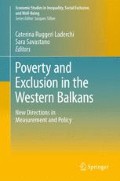Abstract
This chapter presents an application of subjective well-being measures to the analysis of a specific public policy. It explores whether and how activation of social assistance recipients through public works impacts on their subjective well-being outcomes. The program under analysis is the public works program in Serbia. This chapter provides a conceptual framework for understanding the main dimensions of subjective well-being for the unemployed poor and places the overall discussion in the context of work activation of welfare recipients. The applied qualitative analysis of the data obtained from semi-structured in-depth interviews focuses on the changes in different dimensions of subjective well-being. It takes into account the periods before and after the public work activity. Despite the low employment rate of program participants after the completion of the program, the qualitative analysis reveals significant positive impact of work engagement on subjective well-being of social assistance recipients. The evidence is strongest in relation to their positive perceptions about the level of acquired qualifications, skills, and social contacts.
Access this chapter
Tax calculation will be finalised at checkout
Purchases are for personal use only
Notes
- 1.
The wage was 15% higher for those with completed high school and 30% and 45% higher for college and university degree holders, respectively.
- 2.
In this study, social assistance benefit refers to the financial social assistance—“materijalno obezbedjenje” or “novcana socijalna pomoc” (term used since April 2011)—run by the government of Serbia. The financial social assistance is the main guaranteed minimum income program in the country, and it is aimed at individuals and households with an income below the minimum social welfare threshold. As such, social assistance fills the gap between the household’s income and the established threshold.
- 3.
In 2008, the public works program was the only official program involving the activation of social assistance beneficiaries (see Petrovic 2009).
- 4.
Cummins identified 1,500 articles relating to “quality of life” and subsequently developed five criteria for the inclusion of the data on quality of life for the study. The selected 32 studies yielded 173 names of “domains” for the indicators of “quality of life.” Finally, each of the named domains was classified into one of his seven domain categories for the general population.
- 5.
The program under evaluation was Beautiful Serbia program—an ad hoc operation supported by the government of Serbia and donors which provided training and temporary employment to disadvantaged population.
- 6.
See Petrovic (2009).
- 7.
According to adaptation theory, people first react strongly to new circumstances, but they return to their original position over time (Diener et al. 1997).
- 8.
Public pension system in Serbia functions as a pay-as-you-go scheme.
References
Arandarenko, M., & Krstić, G. (2008) Analiza uticaja politike zapošljavanja i aktivnih mera tržišta rada u Republici Srbiji 2003–2007. http://www.inkluzija.gov.rs/wp-content/uploads/2009/10/Analiza-uticaja-politike-zaposljavanja-i-APTR.pdf. Accessed 1 March 2010.
Berg, B. (1989). Qualitative research methods for social science. Boston, MA: Allyn and Bacon.
Bonin, H., & Rinne, U. (2006) Beautiful Serbia, IZA Discussion paper No. 2533. http://ftp.iza.org/dp2533.pdf. Accessed 1 December 2008.
Cummins, R.A. (1996) Domains of life satisfaction: An attempt to order chaos. Social Indicators Research, 38(3), 303-328.
Diener, E. (1984) Subjective well-being. Psychological Bulletin, 95, 542-575.
Diener E., Suh, E., & Oishi, S. (1997) Recent findings on subjective well-being. Indian Journal of Clinical Psychology, 24, 25-41.
Diener, E., & Suh, E. (1997) Measuring quality of life; Economic, social, and subjective indicators. Social Indicators Research, 40(1-2), 189-216.
Frey, B., & Stutzer, A. (1999) Happiness, economy and institutions. The Economic Journal, 110 (466), 918-938.
Frey, B., & Stutzer, A. (2002) Happiness and economics: How the economy and institutions affect human well-being. Princeton: Princeton University Press.
Layard, R. (2006) Happiness and public Policy: A challenge to the profession. The Economic Journal, 116(510), C24–33.
Matkovic, G (2009) Poverty in Serbia during the transition – Trends, policies, dilemmas. http://siteresources.worldbank.org/INTECAREGTOPPOVRED/Resources/GordanaMATKOVIC.pdf. Accessed 1 March 2010.
Matkovic, G., Mijatovic, B., & Petrovic, M. (2010) Impact of the financial crisis on the labor market and living condition outcomes in Serbia, Belgrade, Serbia: CLDS.
Narayan, D., Chambers, R., Shah, M. K., & Petesch, P. (2000) Voices of the poor: Crying out for change, New York: Oxford University Press for the World Bank.
Petrovic (2011) Social Assistance and activation: In search of inclusive policy options, MDG Achievement Fund/Center for Liberal-Democratic Studies, Belgrade, Serbia.
Petrovic, M. (2009) Aktivacija korisnika MOP-a u Srbiji (“Prvi pecat u radnoj knjizici”), Izvestaj za Tim za socijalno ukljucivanje i smanjenje siromastva, Kabinet potpredsednika Vlade za evropske integracije,Vlada Republike Srbije, Srbija.
Van Praag, B., & Ferrer, A. (2004) Happiness quantified: a satisfaction calculus approach. Oxford: Oxford University press.
Veenhoven, R. (2000) Freedom and happiness: A comparative study in 46 nations in the early 1990’s. In Diener, E., & E.M. Suh (Ed.), Culture and subjective wellbeing (pp. 257-288). Cambridge, MA: MIT press.
Veenhoven, R. (1991) Is happiness relative? Social Indicators Research, 24, 1-34.
Veenhoven, R. (2004) Subjective measures of well-being. WIDER Discussion Paper, 2004/07. United Nations University. http://ideas.repec.org/p/unu/wpaper/dp2004-07.html. Accessed 1 December 2008.
Vlada Republike Srbije (2009) Izvestaj o relaizaciji javnih radova od interesa za Republiku Srbiju u 2008. godini. Beograd, Srbija.
Author information
Authors and Affiliations
Corresponding author
Editor information
Editors and Affiliations
Rights and permissions
Copyright information
© 2013 Springer Science+Business Media, LLC
About this chapter
Cite this chapter
Petrovic, M. (2013). Subjective Well-Being, Activation Policies, and the Inclusion Agenda. In: Ruggeri Laderchi, C., Savastano, S. (eds) Poverty and Exclusion in the Western Balkans. Economic Studies in Inequality, Social Exclusion and Well-Being, vol 8. Springer, New York, NY. https://doi.org/10.1007/978-1-4614-4945-4_8
Download citation
DOI: https://doi.org/10.1007/978-1-4614-4945-4_8
Published:
Publisher Name: Springer, New York, NY
Print ISBN: 978-1-4614-4944-7
Online ISBN: 978-1-4614-4945-4
eBook Packages: Business and EconomicsEconomics and Finance (R0)

